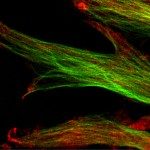Lien vers Pubmed [PMID] – 8736528
Mol. Microbiol. 1996 May;20(3):489-96
In Bordetella pertussis, transcription of virulence-associated genes is regulated by the BvgS and BvgA proteins, members of the bacterial two-component signal-transduction family. BvgS is the transmembrane sensor and BvgA, in its phosphorylated form, is believed to be the key transcriptional activator in B. pertussis. However, the BvgA recognition sites in most virulence promoters have not yet been identified. To investigate the interaction of BvgA with the upstream region of cyaA, the gene encoding adenylate cyclase haemolysin, we have produced large amounts of BvgA in Escherichia coli. The protein was purified from inclusion bodies and then phosphorylated by acetyl phosphate. Using electrophoretic mobility-shift and footprinting assays, we provide evidence that BvgA cannot bind to the cyaA promoter unless it is phosphorylated. The phosphorylated form of BvgA (BvgA-P) is able to bind specifically to the upstream region of cyaA. Analysis of this region revealed that an unexpectedly large sequence, from -137 to -51, appears to be the target for BvgA-P binding, and probably contains multiple binding sites.

